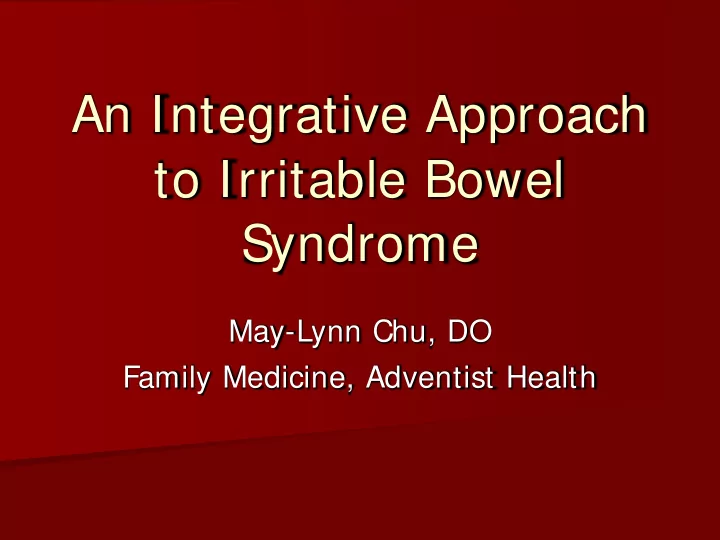

An Integrative Approach to Irritable Bowel Syndrome May-Lynn Chu, DO Family Medicine, Adventist Health
Where to start… First appointment to focus on detailed history – Past medical history (autoimmune conditions, psychiatry conditions, previous surgeries) – Dietary habits – Childhood illness or traumas – Family history of gut syndromes – Recent medication changes/antibiotic use – Work history/personal stressors
Diet General rule – decrease inflammation Remove, replace, repair Eliminate inflammatory ingredients one at a time for 2-3 week period trials. Avoid hard to digest foods like raw vegetables Try fruit without skin Avoid heavy spices or saucy foods Reduce high fat dairy foods. For constipation – Increase soluble fiber in small amounts per day 2-3 grams/day – Beans, fruit, oat products Try eating smaller meals, more often, spread throughout your day. Instead of 3 meals, try 5 or 6 regularly scheduled small meals. Slow down; don't rush through meals
Diet Foods that may cause cramping and diarrhea (what to tell patients to avoid) – Large meals – Foods high in fat content – Fried foods – Caffeine, alcohol – Sorbital containing foods (sweeteners, candies) – Fructose containing foods (some fruits, honey)
Diet Foods that may cause gas bloating (what to tell patient’s to avoid) – Beans – Cabbage – Legumes – Cauliflower – Broccoli – Lentils – Brussel sprouts – Raisins – Onions
Supplements Probiotics – balance the microbiome – Bifidobacterium, lactobacillus and streptococcus L-glutamine (2-5 grams daily, powder form) Peppermint – Enteric coated capsules recommended, dissolves lower in GI tract, reduces risk of reflux Omega 3 fatty acids – Cod liver oil Digestive enzymes (with meals) Magnesium (good if constipation noted) Aloe Vera Cannabidiol oil (anti-inflammatory)
Lifestyle changes Cognitive behavioral therapy – Best evidence Hypnotherapy – gut base Regular exercise – stay in motion as often as possible Yoga Mindfulness exercises Breathing exercises Adequate sleep routine
SIBO (small intestinal bacterial overgrowth) What is it? – Bacterial colonization of the small intestines – Small intestines should have low bacterial count – Large intestines is the place for large bacterial count What causes it? – Any thing that damages the gut What are the symptoms? – Abdominal pain – Bloating – Flatulence – Altered bowel patterns – diarrhea/constipation
SIBO – How to test for this Lactulose breath testing Helps to measure hydrogen and methane gases through fermentation of non- absorbed carbohydrates Test is sensitive but not specific – no gold standard test for SIBO If symptoms are suggestive of SIBO, not responsive to other therapies, treat empirically.
SIBO - Treatment Antibiotics – Rifaximin and Neomycin – Rifaximin for diarrhea predominance (dosed at 550 mg PO 3 times a day for 2 weeks, can extend to 4 weeks if needed) – Neomycin plus rifaxmin for constipation and diarrhea. (Neomycin dosed at 500 mg PO twice daily) Guar gum = prebiotic agent – Favors growth of bifidobacteria and lactobacillus – Rifaximin combined with hydrolyzed guar gum in one study showed a breath test normalization of 85%
SIBO - Treatment Herbal remedies (shown to be as effective as Rifaximin for SIBO symptoms) – Peppermint oil (standard dose 0.2 ml, 3 times a day) – Neem – Allicin – Berberine (goldenseal or Oregon grape) – Oregano – Wormwood (Artemisia) www.siboinfo.com Elemental diet – seeks to starve the bacteria, but feed the person, by replacing meals for 2 weeks – Elemental formulas are powdered nutrients in pre-digested, easily absorbed form – Many brands are available over the counter such as Vivonex Plus, Neocate Jr. & Physicians Elemental Diet.
Resources Reynolds, Kristen H. "Small Intestinal Bacterial Overgrowth: A Case- Based Review." Journal of Patient-Centered Research and Reviews 2.4 (2015): 165-173. Quigley EM. Small intestinal bacterial overgrowth: what it is and what it is not. Curr Opin Gastroenterol. 2014;30:141-6. Scarpellini E, Gabrielli M, Lauritano CE, et al. High dosage rifaximin for the treatment of small intestinal bacterial overgrowth. Aliment Pharmacol Ther. 2007;25:781-6. Logan AC, Beaulne TM. The treatment of small intestinal bacterial overgrowth with enteric-coated peppermint oil: a case report. Altern Med Rev. 2002;7:410-7. de Roest RH, Dobbs BR, Chapman BA, et al. The low FODMAP diet improves gastrointestinal symptoms in patients with irritable bowel syndrome: a prospective study. Int J Clin Pract.
Resources http://www.ncbi.nlm.nih.gov/pubmed/14992438 Gibson PR. Food intolerance in functional bowel disorders. J Gastroenterol Hepatol. 2011;26 Suppl 3:128–131 Ostgaard H, Hausken T, Gundersen D, El-Salhy M. Diet and effects of diet management on quality of life and symptoms in patients with irritable bowel syndrome. Mol Med Rep. 2012;5:1382–1390 Dai C, Zheng CQ, Jiang M, Ma XY , Jiang LJ. Probiotics and irritable bowel syndrome. World J Gastroenterol. 2013;19:5973–598 . Halmos EP , Power VA, Shepherd SJ, Gibson PR, Muir JG. A diet low in FODMAPs reduces symptoms of irritable bowel syndrome. Gastroenterology. 2014;146:67-75.e5
Recommend
More recommend